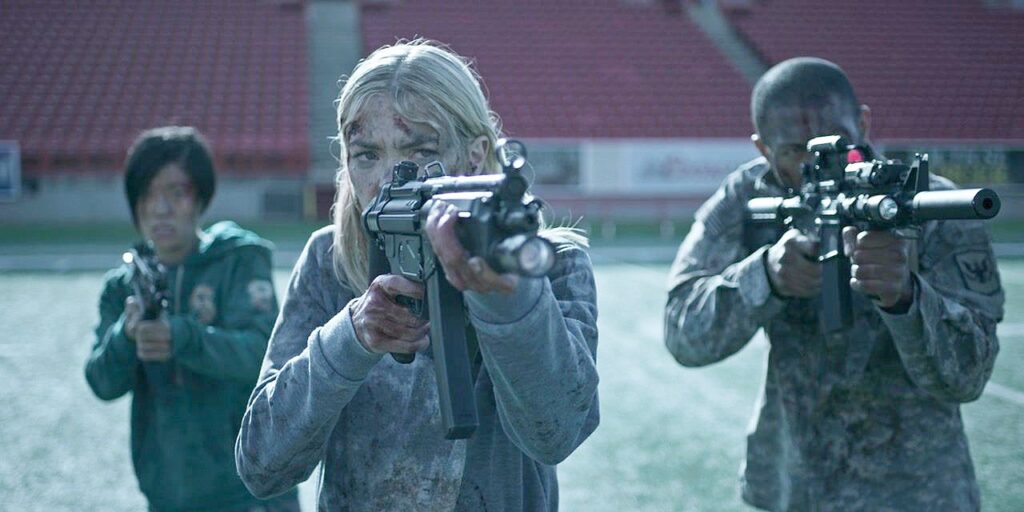Black Summer

A few days ago, I’d never heard of Black Summer, a Netflix zombie show that’s some sort of prequel to Z Nation, which was a SyFy zombie show, which I’ve never seen. Anyway, now I’m obsessed with it.For fans of the zombie genre, Black Summer takes everything you like from the form — tales of survival, tales of courage and cowardice, tales of savage brutality and unexpected grace, tales of corruption and greed and human frailty, and boils away everything down to the bone. There is no moralizing, there is no metaphor, there is no sentimentality, no pontificating, no speeches, no hip cynicism or critique of consumer culture. What remains is breathless, white-hot adrenaline.
Characters have backstories and personalities and all that stuff, but what they don’t have is speeches. Or, in many cases, names. Some have no dialogue at all. There are no “campfire scenes” where the characters express themselves and come to learn something about each other. Instead, we learn who the characters are purely by their actions — how do they handle themselves, how do they carry themselves, how committed are they to survival, how far will they go, what physical punishment will they endure, and how much will they mete out?
There is very little “down time” at all on the show, and very little sense of a “bigger picture.” Each scene is set apart from the others by a title card, and presents a specific tactical situation. You’re in a car being chased by a truck, and you run over a child’s bicycle in the road. Do you stop and get it out from under the car? Do you have the time to do that before the truck catches up? And if you do, who gets out to remove it? Who is the most expendable, who is the bravest, who is the fastest, who is most committed to survival? And then, what about the zombies that are running around, screaming and roaring and gushing blood from their mouths? Is there one behind that garage? Or behind that tree? If you’re the one that gets out of the car, do you trust the driver not to drive off, using you as bait, either to slow down the truck, or to slow down the zombies? There’s an episode in the first season that’s almost entirely a chase scene between a character who is not cut out to face a zombie apocalypse, and an incredibly persistent zombie, without a line of dialogue, just pure action.
David Mamet once mentioned something about audience interest — if you see two men arguing on the street about one owing the other money, you lose interest quickly. But if you see a man walking down the street, and then a car screeches to a halt and another man leaps out and charges at the first man, swearing at him and throwing punches, that will keep you interested, and want to know more about what’s going on with these two.
Black Summer operates entirely on that principle. We’re told nothing whatsoever about the characters, we just have to lean forward and pick up what we can based on how they relate to one another and how well or poorly they navigate their environment. Sometimes we see a group of people and make assumptions about who they are and what they mean to each other, only to learn later that it’s a completely different situation than we thought.
It makes The Walking Dead feel ponderous and sentimental and Game of Thrones feel squeamish. Characters show up in one scene save they day or gain our sympathy, only to turn, seconds later, into a zombie, or be killed in some errant piece of violence or recklessly driven car. Characters we admire are instantly erased from existence without a dying speech, a reverent close-up or even the camera standing still for one second.On top of all this, the scripts, which are uniformly excellent in terms of action writing, tell stories in chopped up order, as we follow characters as they negotiate an obstacle, then follow another character as they try to get into a building, then follow another character we saw in the background from earlier in the episode, then switch to an entirely different character in a different part of town doing something else. And some of those stories overlap and some don’t, and some begin and end in a single scene. I’ve never seen anything as sophisticated as it on television before.
The show has very few sets, is mostly location shooting, with some locations barely dressed at all. That’s one of the pure genius moves of the production team, to put their actors in locations that look completely, absolutely normal, and, using nothing but camera movement and editing, make us dread every shadow and off-camera sound, because every single new piece of information we get could mean a miracle or instant death.
The weirdest part of all this is that Black Summer, like its parent show Z Nation, were produced by The Asylum, creators of Sharknado and ten million other “mockbusters,” cheap knockoffs of hit movies designed to confuse and entice the unwary content consumer, with titles like Transmorphers and Titanic II. How a piece of high art like Black Summer got through their development process, I have no idea.